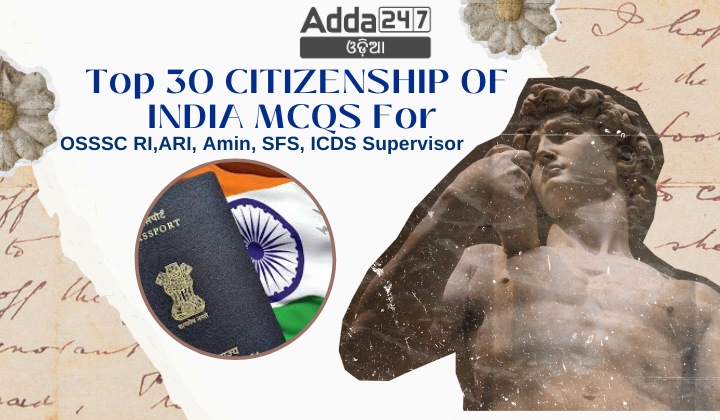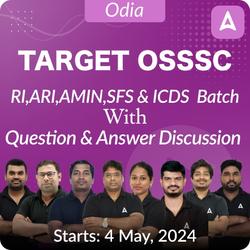The “Top 30 Citizenship of India MCQs” for OSSSC RI, ARI, Amin, SFS, and ICDS Supervisor exams are a vital resource for candidates preparing for these competitive tests. These multiple-choice questions cover essential topics such as the fundamental rights and duties of Indian citizens, the process of acquiring and losing citizenship, and significant amendments related to citizenship. By practicing these MCQs, candidates can enhance their understanding of the constitutional provisions and legal nuances, ensuring a solid preparation for the examinations. This focused approach aids in efficient learning and boosts confidence in tackling related questions during the exam.
Top 30 Citizenship of India MCQS For OSSSC RI,ARI, Amin, SFS, ICDS Supervisor
- Which Article shows Citizenship at the Commencement of the Constitution in the Constitution?
A) Article 6
B) Article 7
C) Article 5
D) Article 11
Answer: C - Which Article of the Indian Constitution pertains to the citizenship of certain persons who have migrated from Pakistan?
A) Article 5
B) Article 6
C) Article 7
D) Article 8
Answer: B - According to which Article, if a person voluntarily acquires the citizenship of another country, he or she will no longer be a citizen of India?
A) Article 9
B) Article 10
C) Article 11
D) Article 8
Answer: A - Which Article grants citizenship rights to migrants of Pakistan who moved after March 1, 1947, and then returned on resettlement permits?
A) Article 5
B) Article 6
C) Article 7
D) Article 8
Answer: C - Which Article provides citizenship to persons of Indian origin residing outside India?
A) Article 5
B) Article 6
C) Article 7
D) Article 8
Answer: D - Which Article empowers Parliament to make any provision regarding the acquisition and termination of citizenship?
A) Article 8
B) Article 9
C) Article 10
D) Article 11
Answer: D - Which Article of the Indian Constitution ensures that any person who is or is deemed to be a citizen of India under any of the foregoing provisions shall, subject to the provisions of any law made by Parliament, continue to be such a citizen?
A) Article 5
B) Article 10
C) Article 11
D) Article 7
Answer: B - Under which Article were people domiciled in India but not born there, yet had one of their parents born there, considered citizens?
A) Article 5
B) Article 6
C) Article 7
D) Article 8
Answer: A
These questions cover key aspects of the citizenship articles in the Indian Constitution, providing a focused review of the topic. - What is the National Register of Citizens (NRC)?
A) A record of all vehicles in India.
B) A register prepared after the Census of 1951 showing residents of each village.
C) A list of all Indian citizens living abroad.
D) A register of all tax-paying citizens.
Answer: B - When was the NRC first published?
A) 1947
B) 1950
C) 1951
D) 1971
Answer: C - What are the NRC of 1951 and the Electoral Roll of 1971 together called?
A) Legacy Data
B) Citizenship Data
C) Historical Records
D) Voter Data
Answer: A - Which articles of the Indian Constitution provide details on citizenship?
A) Articles 1 to 4
B) Articles 5 to 11
C) Articles 12 to 18
D) Articles 19 to 24
Answer: B - What principle for citizenship was favored by the Indian leadership from the time of the Motilal Nehru Committee (1928)?
A) Jus soli
B) Jus sanguinis
C) Jus domicilii
D) Jus matrimonii
Answer: A - Which amendment to the Citizenship Act made it more stringent, requiring both parents to be Indian citizens for those born after December 3, 2004?
A) 1986 amendment
B) 2003 amendment
C) 2005 amendment
D) 2015 amendment
Answer: B - What is the cut-off date for the deportation of illegal migrants as per the Assam Accord of 1985?
A) January 1, 1966
B) March 24, 1971
C) July 19, 1949
D) December 31, 1971
Answer: B - Which section of the Citizenship Act was introduced specifically for Assam?
A) Section 5A
B) Section 6A
C) Section 7A
D) Section 8A
Answer: B - Under the Citizenship Act, 1955, how many years of residency is required for a person of Indian origin to acquire citizenship by registration?
A) 5 years
B) 7 years
C) 10 years
D) 12 years
Answer: B - What does the term ‘jus soli’ refer to in the context of citizenship?
A) Citizenship by descent
B) Citizenship by marriage
C) Citizenship by place of birth
D) Citizenship by naturalization
Answer: C - Which article of the Indian Constitution empowers Parliament to make any provision with respect to the acquisition and termination of citizenship?
A) Article 5
B) Article 6
C) Article 10
D) Article 11
Answer: D - When did the Supreme Court strike down the Illegal Migrants (Determination by Tribunal) Act, 1983?
A) 1991
B) 2000
C) 2005
D) 2010
Answer: C - Which amendment to the Citizenship Act provided for the Citizenship (Amendment) Bill 2019?
A) 2005 amendment
B) 2015 amendment
C) 1986 amendment
D) 2003 amendment
Answer: B - What is the principle of ‘jus sanguinis’?
A) Citizenship by birth
B) Citizenship by place of residence
C) Citizenship by descent
D) Citizenship by marriage
Answer: C - Who led the Assam Movement against illegal immigration?
A) Indian National Congress
B) Bharatiya Janata Party
C) All Assam Students’ Union (AASU)
D) Communist Party of India
Answer: C - Which two documents are required for an individual to be certified as an Indian citizen in Assam?
A) NRC of 1951 and Electoral Roll of 1951
B) Census of 1951 and Electoral Roll of 1971
C) NRC of 1951 and Electoral Roll of 1971
D) Census of 1951 and Birth Certificate
Answer: C - What did the Supreme Court of India decide in August 2019 regarding people born between March 24, 1971, and July 1, 1987, in Assam?
A) They should be included in NRC automatically.
B) They must have ancestral links to India to be included in NRC.
C) They are not required to be included in NRC.
D) They should be granted citizenship by naturalization.
Answer: B - What principle was largely adopted for granting citizenship according to the Citizenship Act, 1955, before amendments?
A) Jus soli
B) Jus sanguinis
C) Jus domicilii
D) Jus matrimonii
Answer: A - What is the purpose of the Citizenship (Amendment) Bill, 2019?
A) To grant citizenship to illegal migrants from neighboring countries.
B) To permit members of six religious communities from Pakistan, Bangladesh, and Afghanistan to live in India if they entered before December 31, 2014.
C) To revoke citizenship from all migrants.
D) To create a new category of citizenship based on occupation.
Answer: B - According to the 2003 amendment to the Citizenship Act, what additional requirement is needed for those born after December 3, 2004, to claim citizenship by birth?
A) One parent must be a citizen.
B) Both parents must be Indian citizens.
C) Either parent must not be an illegal migrant.
D) Both B and C.
Answer: D - Which act places the burden of proof on the individual to show that they are not a foreigner?
A) Citizenship Act, 1955
B) Foreigners Act, 1946
C) Passport Act, 1967
D) Immigration Act, 1983
Answer: B - Which Supreme Court decision is associated with the constitutionality of the 1986 amendment regarding citizenship in Assam?
A) Sarbananda Sonowal v. Union of India
B) Kesavananda Bharati v. State of Kerala
C) Assam Sanmilita Mahasangha v. Union of India
D) Indira Sawhney v. Union of India
Answer: C










